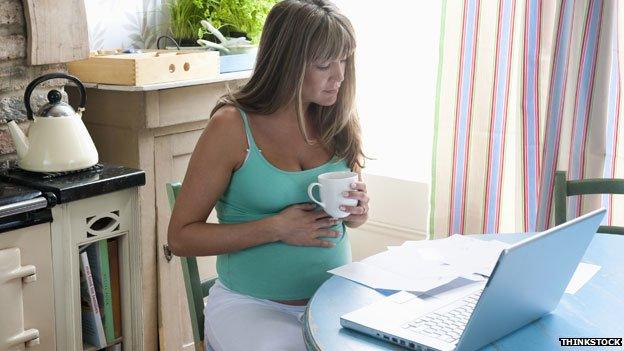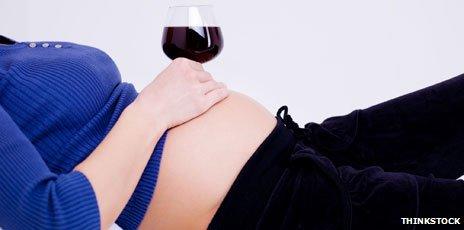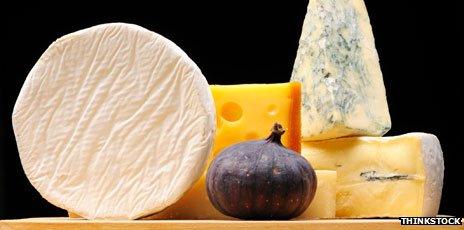Coffee, wine, cheese: How much can pregnant women have?
- Published

Pregnant women face a lot of dos and don'ts when it comes to food and drink, as in other areas of life. Working out where to draw the line is not always easy - though having a good head for statistics can help.
"When I first found out I was pregnant, I really wanted to have a cup of coffee. It was first thing in the morning. And then I thought all of a sudden, 'Oh my gosh - am I even allowed to have one cup of coffee?'" recalls Emily Oster, an associate professor of economics at the University of Chicago.
She turned to the internet and found, not surprisingly, that there was no consensus. Then she found that even books disagreed... and her doctor didn't always agree with the books.
Some writers said pregnant women should avoid coffee completely. Others advised drinking no more than two cups. Yet others drew the limit at three.
"I've read books that said six. And so I felt like there must be an answer to this," says Oster.
"The answer isn't both zero and six. Surely there is an actual number in here, and I wanted to try to understand both why there's so much disagreement but also really what is the right decision."
Using her statistical training, Oster decided to review the medical literature herself.
It is fine to have two cups a day, she concluded. But she describes herself as "more of a two-to-four cups a day coffee lady" - and at this level, she says, the evidence appears to be mixed.
"Early on I felt terrible, and I was not really able to have any coffee which was very sad for me, but once I got into the second and third trimester and I was feeling better, I often had three cups a day and I felt comfortable with that.
"When you look at more - at six or eight cups of coffee - there is some more evidence that that might be risky."
Oster, now the proud mother of a healthy two-year-old girl, has gathered together her work in a book, Expecting Better. She hopes that where the evidence is mixed, readers can consider the facts and make their own decision, based on what they are personally comfortable with.
It is difficult to draw firm conclusions, she says, because most of the studies are not randomised - it wouldn't be fair to divide pregnant women under study into two random groups and ask one group to drink coffee and the other to drink none.
Consequently, Oster says, the people involved in the studies differ in many ways that could affect the course of their pregnancies, not just in their coffee-drinking habits.
"The big issue is that caffeine consumption correlates very strongly with how nauseous you are. A lot of pregnant women are very sick, especially early on - the women who are sicker tend to drink less coffee.
"But we know that being sick is a sign of a healthy pregnancy. And so when we see that women who drink less coffee also have more successful pregnancies we don't really know if that's just about coffee or whether it's really a confounding factor from this nausea."
But coffee was just one item on a long list of forbidden, or semi-forbidden, items that Oster wanted to investigate.
Alcohol for example.

Some health services, like the National Health Service in England, recommend that women avoid alcohol altogether in pregnancy, but Oster says she decided that on the available evidence, she felt comfortable having three glasses of wine - in total - in the first trimester, and then half a glass three or four times a week in the second and third trimester.
"One thing that comes out very quickly, which is very important to emphasise, is that heavy excessive drinking in pregnancy is very dangerous. That's something you see very clearly in the data.," Oster says.
"But when I looked at the evidence on having an occasional drink - a couple of drinks a week maybe in the first trimester, up to a drink a day in later trimesters - I found that the evidence suggests that is safe.
"We don't have large randomised trials, but we do have a lot of high-quality studies which show that the children of women who drink occasionally have very similar outcomes to the children of women who abstain."
This is not the view of the UK's National Health Service.
Dr Vivek Muthu, director for healthcare at the Economist Intelligence Unit and chief executive of the healthcare evidence consultancy, Bazian, says the evidence suggests that even a low alcohol intake can risk damaging the developing foetus.
"Therefore the best and simplest advice which the NHS gives out is not to drink at all," he says.
And while the risk of damage might be lower the less alcohol the pregnant mother drinks, that doesn't mean, Muthu says, that the magnitude of the damage will be lower.
"The consequences could be just as bad as with higher levels of intake, and could result in permanent and severe physical and mental disability," he says.
He adds: "There are additional difficulties around defining from the evidence what a 'low intake' would be in terms of units of alcohol, and how this might be interpreted by different people in practice."
But of course there are many other things pregnant women are told to avoid.
"One of the things I found overwhelming about the food list was that it was just so long," Oster says.
"There were so many things to not eat. I was carrying it around trying to sneak it out during lunch so people wouldn't know I was pregnant. What I came to think was, 'Look I need to understand why these foods are restricted, so I can at least have some sort of framework for understanding what's really going on.'"

Maybe the fig would be OK...
Oster reviewed the last 15 years of data from the US Center for Disease Control on listeria outbreaks.
The evidence on unpasteurised milk and cheese was clearer than on other "banned" foods, Oster says.
"I found that about 20% of those outbreaks can be linked to unpasteurised cheese; about 10% to deli turkey. But there's one outbreak linked to ham; there's one outbreak linked to cantaloupe [melon]; one outbreak linked to celery; one to beansprouts - there are many things like this. And I came to think for a lot of these things there's kind of no way to predict.
"So I decided that on the occasion when I wanted ham, that was OK."
Much of the information pregnant women receive is over-simplified in Oster's view. Doctors just don't have time to explain things in detail, and help patients think through the decisions.
"And so I came to think that maybe it's time for women to understand these decisions - really think through the details carefully for themselves - and that that will ultimately improve the quality of medical care," she says.
"Then you can come into your doctor and say, 'Look, now I understand what's going on, let's talk about how this applies to my particular situation.'"
That, she says, is when "really productive conversations" can happen.